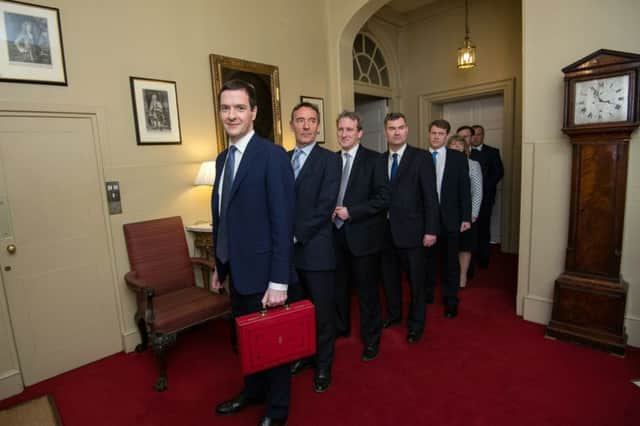Osborne takes the business rate shackles off small firms


Around 600,000 small firms will pay no business rates from next April, while help will be given to people selling goods online or renting out their homes through the internet.
The business rates burden will fall by £6.7bn over the next five years, an annual saving for companies of £6,000, the Chancellor announced to cheers from industry groups.
Advertisement
Hide AdAdvertisement
Hide AdHe told MPs that a typical corner shop in Barnstaple, hairdressers in Leeds and newsagents in Nuneaton will pay no business rates.
Other measures aimed at helping “businesses do business” include cuts in the higher rate of Capital Gains Tax from 28 per cent to 20 per cent and the basic rate from 18 per cent to 10 per cent from April 2016.
Class 2 National Insurance contributions will be abolished for 3.4 million self-employed people.
The Chancellor said he wanted to tackle the “unfairness” caused by a rise in overseas suppliers storing goods in Britain and selling them online without paying VAT, undercutting British firms.
Advertisement
Hide AdAdvertisement
Hide AdTwo new tax-free allowances, each worth £1,000 a year, will be introduced, aimed at micro-entrepreneurs who sell services online or rent out their homes through sites such as Airbnb.
“There will be no forms to fill in, no tax to pay – it’s a tax break for the digital age and at least half a million people will benefit,” said Mr Osborne.
Dr Adam Marshall, acting director general of the British Chambers of Commerce, said: “The Chancellor listened to our calls to avoid higher business taxes and costs – and indeed moved to lower them in a number of areas.
“He has finally taken real action to lessen the crushing burden of business rates, and sharpened incentives for entrepreneurship and investment.”
Advertisement
Hide AdAdvertisement
Hide AdMike Cherry, policy director at the Federation of Small Businesses, said: “In a Budget constrained by both the need to reduce the deficit and the economic outlook, the Chancellor has listened to our calls for the tax system to be made simpler for small businesses and the self-employed and taken important action on business rates.”
David Cutter, Skipton Group chief executive, said: “Clearly, the Chancellor announcing a cut in corporation tax by 2020 is welcome news to us and other businesses in the region. But taken in a wider context, this has to be seen in line with the new eight per cent corporation tax surcharge on banking companies which came into force at the start of this year and also applies to building societies.
“It is disappointing that the Chancellor has not taken the opportunity to lessen the burden on building societies and recognising their different ownership structure, legal constraints and lower risk business model.
“This new tax will cost Skipton Building Society around £6m a year.”
However, Mr Cutter welcomed the changes to business rates.
Advertisement
Hide AdAdvertisement
Hide AdHe added: “Small and medium-sized businesses are the life blood of Yorkshire.
“They bring with them thousands of jobs, millions of pounds to our local economy and show true entrepreneurial grit and determination. 163 years ago Skipton Building Society had just started out as one.
“The Chancellor’s announcement is very welcome news not only for the small business community, but for the wider regional economy too. Money that was going to go to the Government can now stay in Yorkshire.
“Yorkshire is full of hard working, talented people battling to start new ventures or make existing ones succeed, and this will go some way to help them.”
Advertisement
Hide AdAdvertisement
Hide AdCommenting on the Budget, Simon Theakston, the executive director of Masham-based T&R Theakston Ltd, said: “The reduction in business rates is bound to be welcomed by Britain’s pub landlords.
“This will encourage investment and jobs in this hugely important sector particularly in the rural economy.”
The corporation tax cut is one important lever for keeping investment growth on track, according to Andy Tuscher, Yorkshire and Humber region director at EEF, the manufacturers’ organisation.
Mr Tuscher said: “The continued inclusion, however, of investment in plant and machinery in business rate calculations is a disappointment for the steel industry in particular. Government will need to do more to support steel this year.”
Advertisement
Hide AdAdvertisement
Hide AdJonathan Oxley, chairman of the Institute of Directors in Yorkshire and the Humber, said last night: “The thousands of small businesses in the region will welcome the measures designed to help lighten the burden of tax and regulation.”